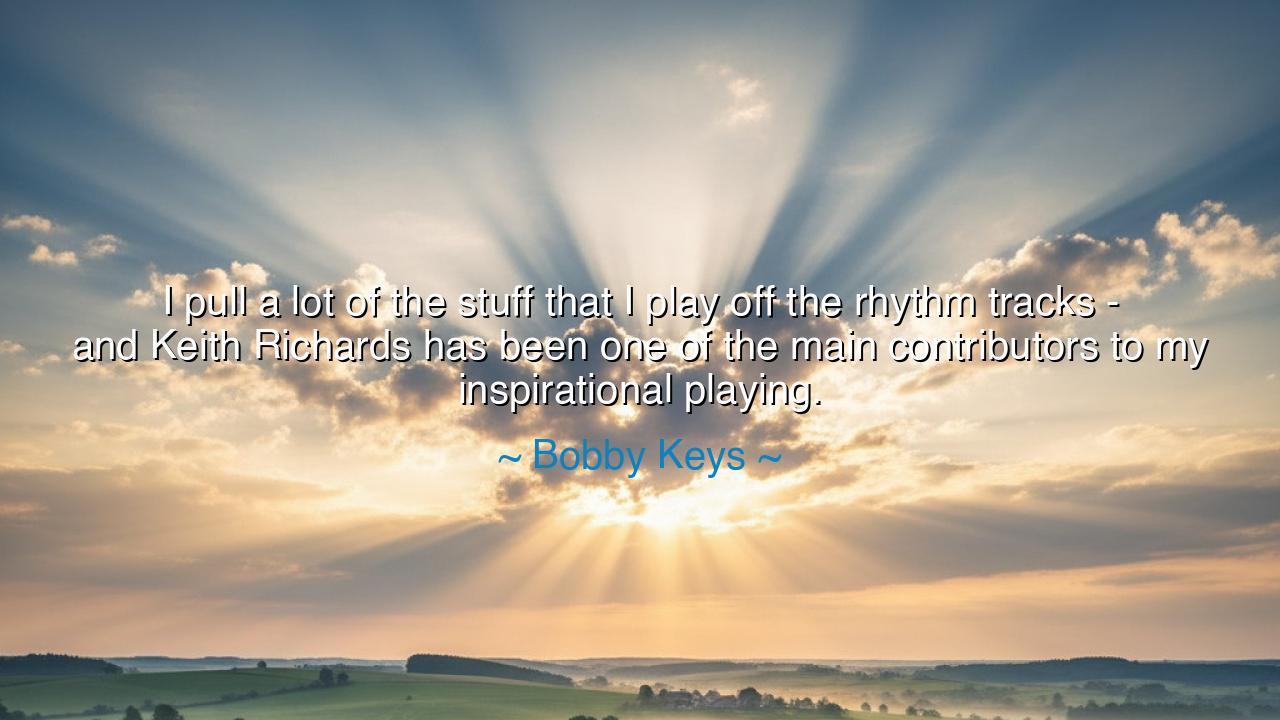
I pull a lot of the stuff that I play off the rhythm tracks - and
I pull a lot of the stuff that I play off the rhythm tracks - and Keith Richards has been one of the main contributors to my inspirational playing.






In the words of Bobby Keys, the legendary saxophonist whose horn carried the heartbeat of rock and roll, we find a reflection of creative brotherhood and timeless inspiration: “I pull a lot of the stuff that I play off the rhythm tracks — and Keith Richards has been one of the main contributors to my inspirational playing.” Though spoken in the humble tone of a musician at ease with his craft, these words carry the spirit of the ancients, for they speak of harmony, influence, and the sacred bond between souls who make music together. Within them lies a truth that echoes through all artistry — that inspiration is not born in isolation, but in the communion of creative energy.
The origin of this quote rests in the long partnership between Bobby Keys and Keith Richards, the fiery heart of the Rolling Stones. Keys was not merely a session musician, but a brother-in-arms, his saxophone a voice that danced and wept beside Richards’s guitar. When he says he “pulls a lot of his playing off the rhythm tracks,” he means that his own improvisations drew life from the foundation laid by rhythm, by the heartbeat of another’s creation. This is the mark of a true artist: to listen deeply, to respond rather than dominate, to let one’s own fire be kindled by the flame of another.
This communion of sound recalls the ancient relationship between the lyre and the voice, or between the drum and the dancer — each giving and receiving energy in an eternal exchange. In olden times, when musicians gathered in temples or around fires, they did not perform alone but together, weaving melodies that were dialogues of the soul. So too did Bobby Keys and Keith Richards create their own ritual of music — one on strings, one on brass — each answering the other like priest and prophet in a shared act of praise to rhythm itself.
Keys’s tribute to Richards also reveals the humility of mastery. Though he was himself a titan of sound, Bobby saw in Keith not competition, but inspiration. To call another’s work a “main contributor” to one’s own is to acknowledge that greatness thrives not through pride, but through recognition and gratitude. Just as the philosopher Plato was shaped by Socrates, or as Michelangelo drew from the art of Ghirlandaio, Bobby Keys knew that to evolve as an artist is to be open — to learn, to absorb, to listen. The true musician does not hoard his sound; he lets it flow through him, shaped by the river of others’ ideas.
Consider, too, the lesson of Beethoven, who, though deaf in his later years, still “heard” the symphonies of those who came before him. He drew upon Mozart’s lightness and Haydn’s structure, transforming them into something vaster and more thunderous. This is the same alchemy that Keys describes: to pull from rhythm, to take what exists and breathe into it new life. Inspiration, then, is not mimicry — it is transformation. It is the sacred act of hearing not just the notes, but the spirit behind them, and letting that spirit awaken something original within one’s own being.
In Bobby Keys’s words there is also a subtle wisdom about collaboration. To be inspired by another is to honor the collective nature of creation — to recognize that art, like life, is never built alone. The rhythm track represents structure, discipline, the order of the world; the saxophone solo represents emotion, freedom, and expression. One without the other is incomplete. The same truth holds for all human endeavor: balance between foundation and flight, between the grounded and the inspired, is what gives birth to enduring beauty.
Let this then be the lesson carried forward: seek your rhythm, but also listen to the rhythms of others. Surround yourself with those whose work awakens your own, as Bobby Keys was awakened by Keith Richards. In every craft — music, art, writing, or living — learn to harmonize rather than compete. Draw strength from those who inspire you, and in turn, become an inspiration to others. For in this chain of influence, stretching from ancient flutes to electric guitars, from temple chants to saxophone riffs, the human spirit continues its song — evolving, unending, and alive.
And so, as Bobby Keys reminds us, the art of creation is not a solitary act but a conversation between souls. Listen deeply. Play boldly. Let the rhythm of another ignite your own. For when we create together — when we let our talents intertwine like melody and harmony — we become part of something greater than ourselves: the eternal music of humanity, the living rhythm of inspiration that has never ceased, and never will.






AAdministratorAdministrator
Welcome, honored guests. Please leave a comment, we will respond soon